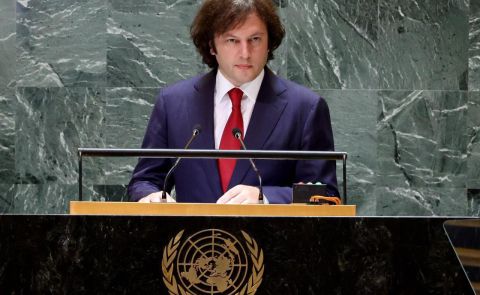
Jena-Cauc: a new research project at the University of Jena explores resilience concept and EU's resilience policies in the South Caucasus

The Institute for Caucasus Studies at Friedrich Schiller University Jena, Germany has started a new three-year research project entitled Resilience in the South Caucasus: prospects and challenges of a new EU foreign policy concept (Jena-Cauc). The project seeks to analyze the impacts of the resilience turn of EU foreign policy in the South Caucasus and its contribution to conflict and crisis prevention. In doing so, it reflects on the resilience concept from different conceptual, epistemological and methodological perspectives and moves beyond an EU focus.
Through an inside-out analysis it focuses on studying preferences of state and non-state stakeholders (e.g. non-governmental organizations, social groups and trade unions) and the role of minority and language policy. Two separate clusters of the project concentrate on the relationship between democracy and resilience in the South Caucasus and the place and role of the resilience approach within the wider regional strategy of the EU in the region. In doing so, the project develops policy-relevant approaches which can contribute to effective implementation and improvement of EU’s regional governance in the South Caucasus region. It is funded by the German Federal Ministry of Education and Research (BMBF).
Further project goals are the structural strengthening of Caucasus Studies at the FSU Jena through the establishment of national and international cooperation in research and teaching, the communication of results to political and civil society actors, and the increase of the visibility of Caucasus Studies through transfer measures, international conferences, and the establishment of an international fellowship program.
The project plans to establish a blog journal and a podcast. Both are intended to reach academic, as well as non-academic audiences with the goal to increase interest for the South Caucasus countries. The blog journal is open to anyone who is interested and informed to write about contemporary developments in the Caucasus including scholars, researchers, freelance writers, activists, artists, civil society members and politicians. Young female researchers and researchers from the Caucasus countries are particularly encouraged to submit their articles.
The Jena-Cauc project is carried out by an interdisciplinary team of five researchers: Prof. Dr. Diana Forker (linguist and principal investigator in the project), Dr. Bidzina Lebanidze (political scientist and principal investigator in the project), Dr. des. Tiffany Williams (political scientist), Irena Gonashvili (political scientist) and Veronika Pfeilschifter (social scientist).
Prof. Dr. Diana Forker contributes to the research cluster ‘Language and minority policies’. Her research areas include East Caucasian (Nakh-Daghestanian) and West Caucasian languages, grammatical description and functional linguistics, sociolinguistics and linguistic anthropology as well as language typology and areal linguistics.
Dr. Bidzina Lebanidze leads the research cluster ‘Global and diffuse risks’. His research interests include EU foreign and Security Policy, International Relations and Global Governance.
Dr. Tiffany Williams contributes to the research cluster ‘Resilience and regional and European integration in the South Caucasus’. Her post-doctoral work focuses on resilience in EU-funded public administration support initiatives implemented in the South Caucasus.
Irena Gonashvili researches for the cluster ‘Resilience and ENP’. Her research focuses on the impact of the resilience turn of the EU’s foreign policy on the ENP/EaP in the South Caucasus countries through exploring different policy areas.
Veronika Pfeilschifter contributes to the research cluster ‘democratization and societal resilience’ by analyzing the political ideologies, marginalization and resilience potential of new post-Soviet left (youth) groups and collectives in the South Caucasus.
Currently, the project hosts two international fellows: Dr. Elguja Khokrishvili and Natia Botkoveli. Dr. Khokrishvili’s main research interests include regional economic development, sustainable fiscal and tax policy, fiscal decentralisation and green economy. Ms. Botkoveli’s research interests and experiences include language policy planning, minority languages and language rights.
The project is advised by eleven researchers from Azerbaijan, Armenia, Georgia and Germany: Prof. Dr. Ashot Aleksanyan, Yerevan State University, Armenia; Prof. Dr. Rafael Biermann, University of Jena, Germany; Dr. Tsypylma Darieva, Centre for East European and International Studies (ZOiS), Berlin, Germany; Armen Grigoryan, Centre for Policy Studies, Yerevan, Armenia; Prof. Dr. Jago Kachkachishvili, Tbilisi State University, Georgia; Prof. Dr. Kornely Kakachia, Georgian Institute of Politics, Tbilisi, Georgia; Prof. Dr. Olaf Leiße, University of Jena, Germany; Prof. Dr. Joachim von Puttkamer, University of Jena, Germany; Dr. Franziska Smolnik, The German Institute for International and Security Affairs, Berlin, Germany; Prof. Dr. Tornike Turmanidze, Tbilisi State University, Georgia and Dr. Anar Valiyev, ADA University, Azerbaijan.
To learn more about the project and its members, as well as upcoming plans please visit the website: https://www.kaukasiologie.uni-jena.de/jena-cauc/about
Facebook: https://www.facebook.com/Kaukasiologie
Twitter: @Kaukasusstudien (Institute for Caucasus Studies) and @jenacauc (Jena Cauc project)
See Also


Armenia Reaffirms Peace Deal Readiness, Criticizes Azerbaijan's Preconditions

ING's Forecast for Azerbaijan Highlights Oil Price Risks and Gold Export Opportunities

Georgian PM to Attend European Political Community Summit

Putin Urges Georgia to Uphold Friendship Traditions, Signature Collection Begins in Tbilisi to Restore Ties

